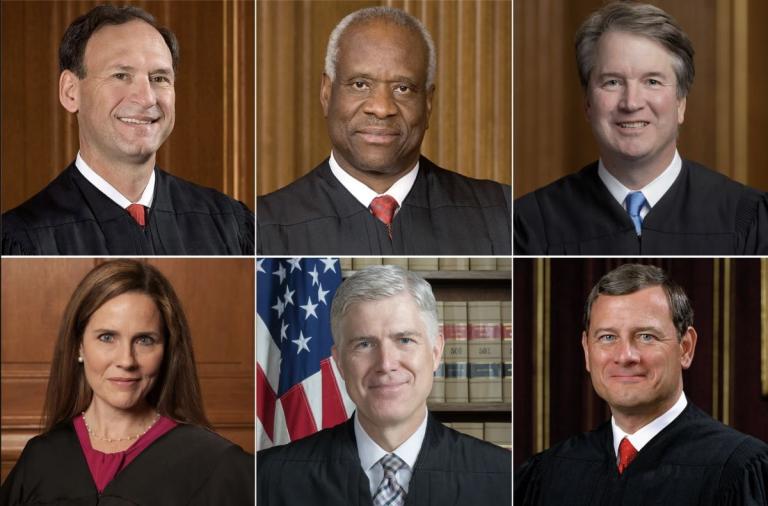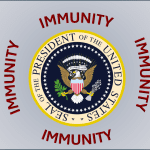The Bible has something to say about the tyranny of kings. Here are 3 passages for responding to the Supreme Court ruling establishing presidential immunity.

Many in the U.S. are rightfully in an uproar about the recent ruling by the U.S. Supreme Court that the president is immune from investigation or prosecution of any “official act” during his presidency.
The ruling consolidates executive power and eliminates congressional and judicial oversight, thus enabling a president to engage in corruption or crimes under the guise of “official acts” with impunity.
The SCOTUS decision has significant implications for preaching and ministry.
In my previous piece, I urged clergy to speak out against the establishment of authoritarianism.
One place to start is preaching or teaching a series on what the Bible says about the tyranny of kings and emperors. Scripture witnesses to a long and complicated relationship between the people and those who rule over them.
Granted, our context differs in many ways from that of ancient Israel. Nevertheless, there are many aspects of the biblical critique of kings that can inform the church’s approach to the SCOTUS decision.
Here are three passages from the Hebrew Scriptures with a synopsis of each story and what we can learn for our current fight against tyranny.
[Stay tuned for: 3 New Testament Passages about the Evils of Autocrats.]
3 Passages About the Tyranny of Kings and Emperors in the Old Testament
Samuel Warns the Israelites about the Tyranny of Kings
The people of Israel complained that they did not have a king like other nations did. They believed that having a strongman as their leader would guarantee their survival and help them defeat other nations. God, through the prophet Samuel, warns that this king will conscript their young men for armies, sending them to their deaths in many battles (1 Sam. 8:11). The king will take the wealth of the people and give it to his cronies (v. 15). The people will no longer have control over their labor, their possessions, or their own bodies, for they will “be his slaves” (v.17).
Despite this warning, the people insist on having a king.
So God tells Samuel to anoint Saul. He turns out to do exactly as Samuel predicts. He engages in ongoing wars, enriches himself and his cohort, and sins against God.
The bottom line? People clamoring today for a strongman will get exactly what they wish for if we do not stop them. If we allow the establishment of a king, all of us will suffer, just as the Israelites did. Saul believed he was above the law; he ruled ruthlessly and with impunity. The Republican candidate will do the same now that the Supreme Court has granted such broad immunity.
A government by the people and for the people may be messy and imperfect, but it is our best hope for freedom from tyranny.
Deuteronomy Stipulates No Ruler is Above the Law
Long before Samuel became the first king of Israel, the book of Deuteronomy foresaw that the people would want a king “like all the nations,” (Deut. 17:14). So, the book lays out parameters for the future king that limit his authority and power.
The king must be one of their own and not influenced by any foreign power (v. 15). He is to eschew wealth, pomp, and military power (v. 16). He must not become entangled in political marriages with royal families from other nations so that he won’t be tempted to betray his people (v. 17). And he must obey the law (v. 19).
Most importantly, Deuteronomy stipulates that the king must neither “exalt himself above other members of the community nor turn aside from the commandment” (v. 20).
While the U.S. is very different from the governance structure of ancient Israel, it is disturbing to see that the Supreme Court ruling has exalted the office of the President above other members of the community. The ruling gives permission for the president to do whatever he pleases, so long as it is an “official act.”
And because the ruling states that neither Congress nor the courts can even “examine” the president’s powers, there is no longer any mechanism for accountability if he does something unlawful or unconstitutional.
Trump has blatantly demonstrated his love of wealth, pomp, and military power.
He has betrayed his nation by cozying up to the dictators of hostile foreign nations. He and his family benefited financially from their access to power when he was in office and sold out to foreign influence. And he and his supporters have asserted Nixon’s argument that nothing a person does is a crime if he is the president.
Drawing on the book of Deuteronomy, those who adhere to the Judeo-Christian religions can make the case that we have a moral, biblical, and ethical obligation to protest the SCOTUS ruling. We must nonviolently resist its implementation. And we must call on those who are currently in leadership to do everything in their power to negate this ruling and restore accountability to all branches of our government.
We need to mobilize congregations to unite with other people of faith to vote and use all our resources to nonviolently resist the fascist takeover of our country.
God Opposes Corrupt Shepherds – Leaders Who Fleece Their Flock
In the Bible, the image of the shepherd is used as a metaphor for the leaders of Israel. When leaders align with the ethical commandments of God, they are considered “good shepherds.” But when they are corrupt, violent, and fail to protect the vulnerable, God, through the voices of prophets like Jeremiah (see Jer 23:1-8) and Ezekiel, calls them to account.
Ezekiel 34:1-10 has particular resonance when considering the current conservative judicial leaders on the Supreme Court.
The prophet accuses the shepherds of engorging themselves and exploiting the very sheep entrusted to them. Instead of making sure the people are fed, cared for, and protected from predators, these evil shepherds swing wide the door for the wolves.

Some conservative Justices have received untold riches from billionaire benefactors in exchange for rulings in their favor. They have stripped away protections for women, criminalized those without homes, and weakened protections for the environment. They have taken away rights of ordinary citizens while bolstering the power of corporations to wield political influence.
And now with the recent ruling overturning the Chevron doctrine, the power to regulate for the safety and health of Americans has been severely weakened. Polluting industries and greedy corporations are already preying on the public interests for their own financial gain and power. Now we are truly “food for all the wild animals” – those who prey on the weak and defenseless (Ez. 34:5).
It is vital for preachers to proclaim that judicial leaders coddling and enabling the predators is not God’s will.
Ezekiel is very clear about this: “Thus says the Lord God, I am against the shepherds . . . I will rescue my sheep from their mouths, so that they may not be food for them” (Ez. 34:10).
So what does God require of the shepherds?
Ezekiel is clear about this as well. They are to strengthen the weak, heal the sick, bound up the injured, bring back the strayed, and seek the lost (Ez. 34:4). Thus, people who follow the teachings of Scripture must speak out against those who rule with “force and harshness” (Ez. 34:4).
People of faith must support those leaders who have the best interests of the community at heart. At the same time, we must vote out, resist, and confront those who enrich themselves and their wealthy friends at our expense.
When the church fights against tyranny while advocating for and with the people for fairness and protecting the vulnerable, this will be an indication that we are aligned with the God of restoration.
[Stay tuned for: 3 New Testament Passages about the Evils of Autocrats.]
Read also:
How Should Clergy Respond to Presidential Immunity Ruling?
Election Resources for Faith Leaders: Defend Democracy and Resist Tyranny
Preaching 2024 Election – How will Clergy Navigate Issues?

The Rev. Dr. Leah D. Schade is the Associate Professor of Preaching and Worship at Lexington Theological Seminary in Kentucky and ordained in the ELCA. Dr. Schade does not speak for LTS or the ELCA; her opinions are her own. She is the author of Preaching in the Purple Zone: Ministry in the Red-Blue Divide (Rowman & Littlefield, 2019) and Creation-Crisis Preaching: Ecology, Theology, and the Pulpit (Chalice Press, 2015). She is the co-editor of Rooted and Rising: Voices of Courage in a Time of Climate Crisis (Rowman & Littlefield, 2019). Her newest book is Introduction to Preaching: Scripture, Theology, and Sermon Preparation, co-authored with Jerry L. Sumney and Emily Askew (Rowman & Littlefield, 2023).













